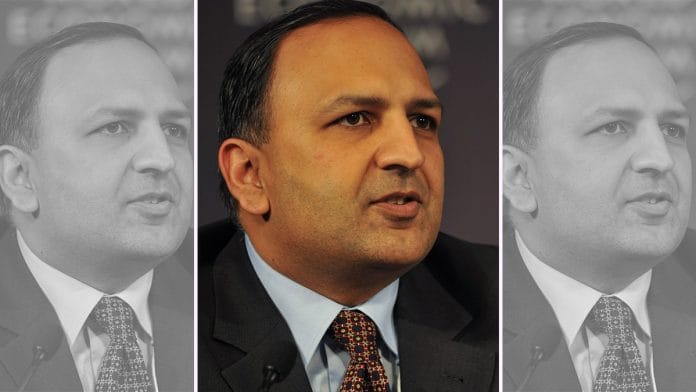New Delhi: Ashoka University, a liberal arts institute, has found itself at the centre of a furore following the resignation of public intellectual Pratap Bhanu Mehta and the subsequent departure of noted economist Arvind Subramanian Thursday. In his resignation letter, Mehta said the founders made it “abundantly clear” that his association with the institution was a “political liability”.
The resignations have led academics, students and faculty members to question the idea of “academic freedom” at the university, which advertises itself as an institution that encourages its students to think and question freely. In fact, there have been protests by students.
Mehta had stepped down as vice-chancellor of Ashoka University after the 2019 general elections in India.
“The university will be the poorer without Pratap [Bhanu Mehta],” said ThePrint’s Editor-in-Chief Shekhar Gupta in episode 706 of ‘Cut the Clutter’ Thursday. He also credited the university’s founders for building a new institution in such a short period of time and to keep it going “given the environment” as a “great achievement”.
He remarked that it is important that the university “survives this little hump”, especially for other similar “experiments” like Christ University, Shiv Nadar University, Krea University, O.P. Jindal University and Azim Premji University.
‘Govt has become less tolerant of criticism’
First, Gupta provided some background on Mehta, especially his column for The India Express. “Pratap, over the years, has turned out to be among our most perceptive, but also among our most cutting columnists,” said Gupta, adding that his column has always been about “questioning” the government.
Gupta explained that when the UPA government was in power, Mehta was still “deeply critical” of it while he was president of Centre for Policy Research (CPR) and a convener member of the National Knowledge Commission. “Usually, you wouldn’t expect someone of Pratap’s stature to be having a transactional relationship with the government,” he said.
Gupta also shed light on the academic and intellectual climate after the BJP was voted into power at the Centre, first in 2014. He pointed out that this was a majority government unlike the previous coalition governments. “This government does not have an intellectual environment, or ecosystem surrounding it. It views the other ecosystem with suspicion,” he said.
He explained that there was a feeling of suspicion towards all other intellectuals, perceived as “left liberals” and stated that the current government has become “less tolerant of criticism”.
He also laid emphasis on the exit of Subramanian, a former chief economic adviser to the Government of India who had been part of setting up a new centre of economics education at Ashoka University.
Also read: Mehta’s columns, new plot behind exit, Ashoka University students claim. Not true, says univ
‘Ashoka’s founders unlikely to make compromises for material reasons’
Gupta also sought to clear up speculation that Mehta’s exit had to do with the university’s inability to move forward with a new plot of land to expand the campus. “I’ve seen some anonymous writings that this was to do with a plot [of land]. It was not to do with the plot. That plot had been acquired by the university almost three and a half years ago,” said Gupta. The controversy didn’t have anything to do with foreign contributions regulations either, he added.
“These are not founders who make compromises for material reasons,” said Gupta, who went on to list some of Ashoka University’s 154 founders who privately fund the institute.
They include billionaire and Rajya Sabha member Anu Aga, PropTiger CEO Dhruv Agarwala, CEO of the IT-ITES Sector Skill Council at NASSCOM Amit Aggarwal, investor Samir Arora, industrialist Puneet Dalmia, author Gurcharan Das, philanthropist & former business Vikram Gandhi and many more.
“All of them [founders] do not vote on one side in our elections,” Gupta said.
Bajwa’s remarks on ‘stable’ India-Pakistan ties
Gupta also briefly spoke on Pakistan Army chief General Qamar Javed Bajwa’s remarks at the first-ever Islamabad Security Dialogue Thursday, where he said a “stable” relationship between New Delhi and Islamabad is key to unlocking the potential of South and Central Asia.
He pointed out that though Bajwa spoke about the need to resolve the Kashmir dispute in his speech, he did not talk about the scrapping of special status in Jammu and Kashmir on 5 August 2019.
“It did seem like that there was an acceptance of this status quo there or the fait accompli,” Gupta said.
“He [Bajwa] said if India-Pakistan relations improve, then India will get access to Central Asia … Is he making it conditional to the settlement of what he sees as the Kashmir issue? Or is this an initiative?” Gupta noted.
Also read: Ashoka students protest Mehta’s exit, faculty seeks clarity on hiring & dismissal protocols







See aricle in swarajya Magazine pb mehta exit ashoka founders forgot a basic dictum first who then what